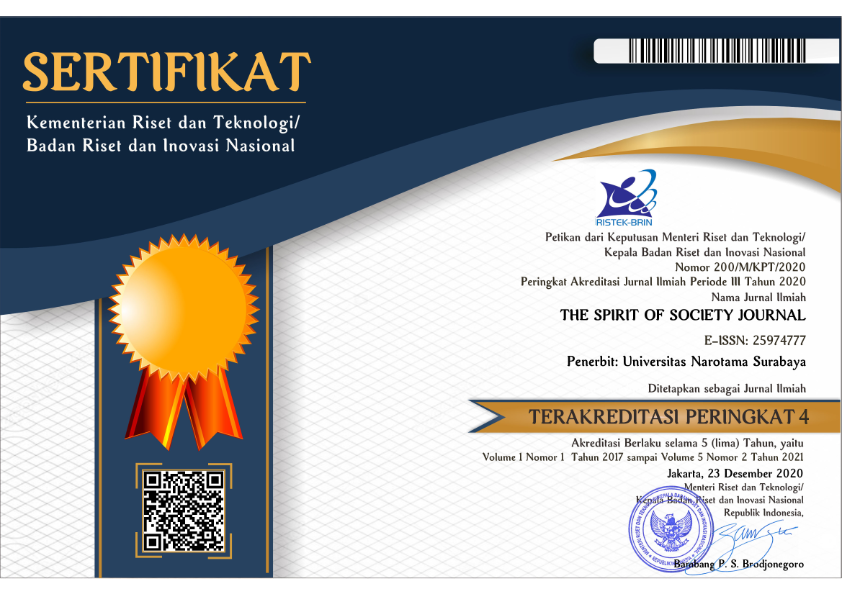The Impact Of Online Misinformation On Covid-19 Vaccines: A Literature Review
Abstract
The spread of COVID-19 misinformation has contributed to what has been labelled as a crisis of trust. This decline in trust has been reinforced by legitimate criticism of government responses to the pandemic and the exacerbation of pre-existing mistrust in governments and health services, particularly amongst marginalized groups. This study aims to analyse the COVID-19 vaccines misinformation and its impact to the life aspect of the society. This study was a literature review discussing about COVID-19 vaccines misinformation and its impact. Based on the database and keywords, 15 articles were obtained, but only 7 articles had relevant topics. COVID-19 vaccines misinformation can lead to several impacts namely the damage on the prevention and control action regarding to COVID-19. Moreover, this misinformation also can be as the stimulus undermines the COVID-19 individual responses that will affect the willingness of society’s vaccines uptake. Misinformation of COVID-19 vaccines can be classified into several types such as misleading contents, manipulated content, false content and fabricated content. Those misinformation lead to the condition of society’s acceptance toward COVID-19 vaccines and damage the management of COVID-19 prevention and control actions that are conducted by the Government.
Downloads
References
Barua, Z. et al. (2020) ‘Effects of misinformation on COVID-19 individual responses and recommendations for resilience of disastrous consequences of misinformation’, Progress in Disaster Science, 8, p. 100119. doi: 10.1016/j.pdisas.2020.100119.
Germani, F. and Biller-Andorno, N. (2021) ‘The anti-vaccination infodemic on social media: A behavioral analysis’, PLoS ONE, 16(3 March), pp. 1–14. doi: 10.1371/journal.pone.0247642.
Goldstein, S. et al. (2015) ‘Health communication and vaccine hesitancy’, Vaccine, 33(34), pp. 4212–4214. doi: 10.1016/j.vaccine.2015.04.042.
Haikal, H. (2020) ‘Persepsi Masyarakat terhadap Hoax Bidang Kesehatan’, Jurnal Manajemen Informasi dan Administrasi Kesehatan (JMIAK), 3(2), pp. 7–11. doi: 10.32585/jmiak.v3i2.836.
Kerr, J. R. et al. (2021) ‘Effect of information about COVID-19 vaccine effectiveness and side effects on behavioural intentions: Two online experiments’, Vaccines, 9(4), pp. 1–22. doi: 10.3390/vaccines9040379.
Lewandowsky, S. et al. (2021) ‘The COVID-19 Vaccine Communication Handbook. A practical guide for improving vaccine communication and fighting misinformation.’, pp. 1–21. Available at: https://sks.to/c19vax.
Lockyer, B. et al. (2021) ‘Understanding COVID-19 misinformation and vaccine hesitancy in context: Findings from a qualitative study involving citizens in Bradford, UK’, Health Expectations, 24(4), pp. 1158–1167. doi: 10.1111/hex.13240.
Loomba, S. et al. (2021) ‘Measuring the impact of COVID-19 vaccine misinformation on vaccination intent in the UK and USA’, Nature Human Behaviour, 5(3), pp. 337–348. doi: 10.1038/s41562-021-01056-1.
Mills, M. C. and Sivelä, J. (2021) ‘Should spreading anti-vaccine misinformation be criminalised?’, The BMJ, 372(February), pp. 1–3. doi: 10.1136/bmj.n272.
Murphy, J. et al. (2020) ‘Preparing for a COVID-19 vaccine: Identifying and psychologically profiling those who are vaccine hesitant or resistant in two general population samples’, 44(0). doi: 10.31234/osf.io/8dtnq.
PAHO & WHO (2020) ‘Understanding the i nfodemic and misinformation in the fight against COVID-19 | DIGITAL TRANSFORMATION TOOLKIT’, DIGITAL TRANSFORMATION TOOLKIT.
Pierri, F. et al. (2021) ‘The impact of online misinformation on U.S. COVID-19 vaccinations’. Available at: http://arxiv.org/abs/2104.10635.
Priastuty, C. W. et al. (2020) ‘Hoaks tentang Vaksin Covid-19 di Tengah Media Sosial’, Prosiding Seminar Nasional Unimus, 3, pp. 391–399. Available at: https://prosiding.unimus.ac.id/index.php/semnas/article/view/641.
Purike, E. and Baiti, A. (2021) ‘Informasi Vaksin Di Media Sosial Dan Program Vaksin Covid-19: Langkah Apa Yang Dapat Dilakukan Oleh Pemerintah Republik Indonesia?’, Cross-border, 4(2), pp. 58–69. Available at: http://journal.iaisambas.ac.id/index.php/Cross-Border/article/view/635.
Saling, L. L. et al. (2021) ‘No one is immune to misinformation: An investigation of misinformation sharing by subscribers to a fact-checking newsletter’, PLoS ONE, 16(8 August), pp. 1–13. doi: 10.1371/journal.pone.0255702.
West, Richard; Turner, L. H. (2007) Pengantar Teori Komunikasi Edisi 3 Analisis dan Aplikasi. 3rd edn. Jakarta: Salemba Humanika.
Copyright (c) 2022 THE SPIRIT OF SOCIETY JOURNAL : International Journal of Society Development and Engagement

This work is licensed under a Creative Commons Attribution-ShareAlike 4.0 International License.












